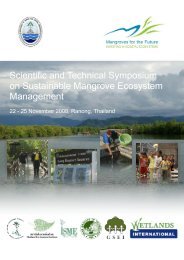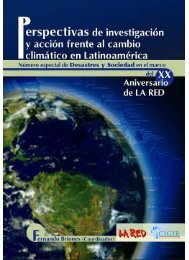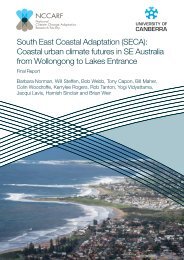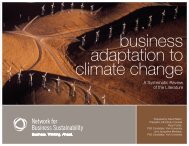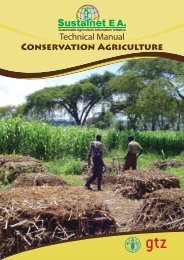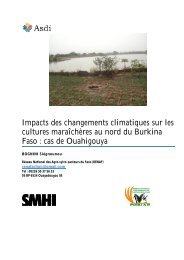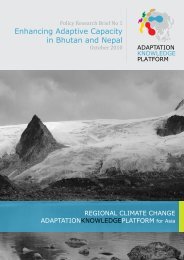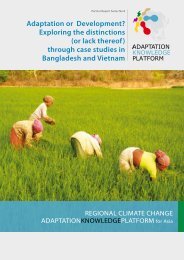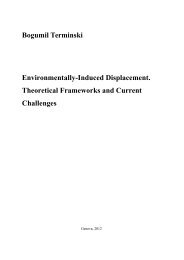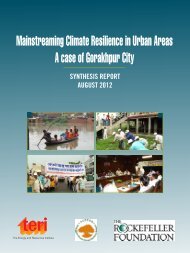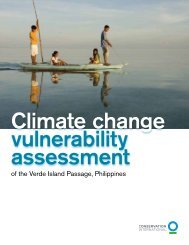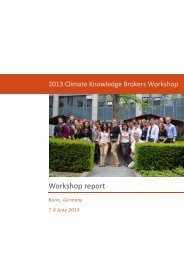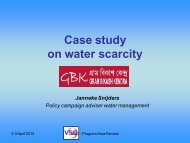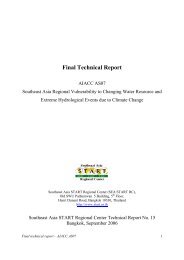These are key in terms of increasing the variety of local <strong>food</strong> you can access,especially if you’re renting, <strong>and</strong> you can grow short-term crops <strong>and</strong> swap them forlonger-term crops that you can’t grow. The <strong>food</strong> swaps fill a really critical niche, interms of a resilient local <strong>food</strong> system. They are a great social network… we havefantastic social networks in our community, constantly swapping <strong>and</strong> giftingproduce. [Backyard gardener <strong>and</strong> permaculturalist, Melbourne].7 Barriers to <strong>urban</strong> agricultureThe principal political barrier to the expansion of <strong>urban</strong> agriculture is the perceived lackof any strategic vision for a sustainable <strong>and</strong> resilient <strong>food</strong> system, in the two case studycities or their respective estates. This expresses itself most acutely in relation to theexpansion of the <strong>urban</strong> growth boundary over prime farml<strong>and</strong> in Melbourne; but it isseen more broadly in the failure to fully integrate considerations of health <strong>and</strong> wellbeinginto state <strong>and</strong> federal planning <strong>and</strong> policy frameworks.The previous government of Victoria (the Brumby administration) attempted toestablish a state-wide, whole-of-government, integrated <strong>food</strong> policy. Some intervieweessuggested that this policy initiative ‘ran into the s<strong>and</strong>s of obstructionism’ from within theDepartment of Primary Industries which was not convinced of the need for it.So we had a reasonable commitment to doing this. But it really just dragged, <strong>and</strong>when I look back now to some of the stuff we’d come up with, <strong>and</strong> had committedto in regional policy <strong>and</strong> <strong>climate</strong> <strong>change</strong> <strong>food</strong> strategy, the whole-of-government<strong>food</strong> strategy. We understood why we’re doing it, <strong>and</strong> it had strong links to<strong>climate</strong> <strong>change</strong>, <strong>and</strong> everything else – now we know that DPI was just basicallystalling it, at every possible opportunity. You’d have everything agreed, everyoneon side, <strong>and</strong> then you’d get this memo, saying, you can’t have this, why don’t youre-write that. And we’d be completely back to scratch. And there was justdragging of feet – so much time <strong>and</strong> energy going into something, that it wasalmost like a plaything at one level. They had to be forced. If the political will’s notthere to really make it happen, it doesn’t matter how much pushing you do fromthe policy officer level. There was an incredible educational process for thepeople involved. We took that many people from traditional DPI, who thought that<strong>food</strong> <strong>security</strong> is just about choice, <strong>and</strong> if people are fat, it’s because they’re eatingthe wrong <strong>food</strong>, through so many discussions of explaining, opening people’sheads…I’m sure it had a lot of educational benefits for a lot of people, butultimately it didn’t deliver anything on the ground [Former state governmentemployee, Melbourne].Reflecting on the failure of this attempt to establish an integrated <strong>and</strong> holistic state-wide<strong>food</strong> policy for Victoria, which would, amongst other things, have accorded a prominentrole to <strong>urban</strong> <strong>and</strong> peri-<strong>urban</strong> agriculture, <strong>and</strong> in particular to the protection of primefarml<strong>and</strong> close to the city, this interviewee identified a culture inside the Stategovernment, especially at more senior levels, which strongly militated against policy<strong>change</strong> of this nature:People would just say, agriculture’s DPI, but that wasn’t what I was talking about.So I really began to see how this h<strong>and</strong>balling phenomenon worked inside<strong>Urban</strong> <strong>food</strong> <strong>security</strong>, <strong>urban</strong> <strong>resilience</strong> <strong>and</strong> <strong>climate</strong> <strong>change</strong> 133
government; <strong>and</strong> that trying to get people to talk about complex issues who didn’thave clear lines of responsibility was very difficult. You can get thoseconversations happening at officer level, <strong>and</strong> maybe at manager level, but it’svery hard to get real openness to people above that [level] thinking outside thebox [Former state government employee, Melbourne].In Queensl<strong>and</strong>, the Newman government has commissioned an inquiry into the state’sagricultural <strong>and</strong> resource industries, <strong>and</strong> this focuses primarily on identifying <strong>and</strong>removing unnecessary regulatory barriers, <strong>and</strong> there is little recognition of l<strong>and</strong> useconflicts except in relation to tensions between famers <strong>and</strong> miners in, for example, theDarling Downs.At the local government planning level there also seem to be a general lack ofawareness <strong>and</strong> a complacency around <strong>food</strong>, translating into a barrier to the greaterexpansion of <strong>urban</strong> <strong>and</strong> peri-<strong>urban</strong> agriculture; <strong>and</strong> more broadly to the construction ofa sustainable <strong>and</strong> resilient <strong>food</strong> system:There is a lack of awareness of the importance that <strong>food</strong> can play in communitydevelopment, within the system that’s making the decisions. Food’s always beenat the heart of community development, it was at the basis of human communitydevelopment, 8,000 years ago when [agriculture <strong>and</strong> civilisation] first emerged.But it’s something that’s relatively [absent] from planning schemes <strong>and</strong> language,in that whole sector of planning <strong>and</strong> community development, it hasn’t quiteemerged as a priority. That’s one of the main drivers behind [<strong>food</strong> in<strong>security</strong>], that<strong>food</strong> doesn’t have a place at the table when major decisions are being made… Itgoes to this assumption that our <strong>food</strong> system will always come from somewhereelse. That seems to be a story that’s guaranteed by government, or privateindustry, which says that we’ll always be able to go elsewhere to source our <strong>food</strong>.But that’s not a tested theory. It’s just an assumption that’s been made [Localgovernment employee, Melbourne].Adding another dimension to the lack of political support for <strong>urban</strong> agriculture are theexisting regulatory regimes <strong>and</strong> policies that provide on the ground obstacles to therealisation <strong>and</strong> expansion of <strong>urban</strong> agriculture practises across Australia. On the GoldCoast for example, much attention has been placed on the Council’s commitment tohave 100 community gardens by 2020, but, as expressed by some interviewees, thattarget will struggle to come to fruition based on their own experience of dealing withCouncil <strong>and</strong> its policies:We started [the Ashmore community garden project] in 2010… However, overthat time the specifications for what we needed to achieve to be eligible to get thegarden had <strong>change</strong>d… [Then, council told us] it’s probably better to look at thecommunity gardens starting kit, but I don’t think that’s the current process anywaybecause we keep being told that there are new processes being developed <strong>and</strong>new procedures ... Like in the past we’ve worked to what council tells us <strong>and</strong> thenthey <strong>change</strong> their mind once you’ve done it [saying] ‘oh that’s great but youshouldn’t have done it’ [Community gardener, Gold Coast].In an attempt to address the lack of guidance <strong>and</strong> the confusing nature of communitygarden planning presented above, the newly elected Gold Coast City Council has<strong>Urban</strong> <strong>food</strong> <strong>security</strong>, <strong>urban</strong> <strong>resilience</strong> <strong>and</strong> <strong>climate</strong> <strong>change</strong> 134
- Page 1 and 2:
Synthesis and Integrative ResearchF
- Page 3 and 4:
Published by the National Climate C
- Page 5 and 6:
ABSTRACTFood security is increasing
- Page 7 and 8:
1. a review of the literature: on n
- Page 9 and 10:
its Food for All project. This help
- Page 13 and 14:
In response to the existential thre
- Page 15 and 16:
2. OBJECTIVES OF THE RESEARCHFood i
- Page 17 and 18:
debates and to the more systematic
- Page 19 and 20:
organisation in the past few years.
- Page 21 and 22:
4. RESULTSIn this section we presen
- Page 23 and 24:
increasing productivity. Thus, whil
- Page 25 and 26:
people and the origins of their foo
- Page 27 and 28:
urban food supply chains. Thus, whi
- Page 29 and 30:
This logistics system is dominated
- Page 31 and 32:
Like Hodgson et al., as per definit
- Page 33 and 34:
esilient, powerful by being locally
- Page 35 and 36:
volume or even its contribution to
- Page 37:
community food growing can have on
- Page 40 and 41:
generations this history has been f
- Page 42 and 43:
a stronger focus on addressing the
- Page 44 and 45:
The third key aspect is fairness -
- Page 46 and 47:
climate (which we live and work in
- Page 48 and 49:
agriculture. Eight percent is in ur
- Page 50 and 51:
This concept of the ‘spaces in be
- Page 52 and 53:
esearch scientist and chair of the
- Page 54 and 55:
As discussed above, protection of t
- Page 56:
4.2.5 What is the extent and the im
- Page 60 and 61:
no place under the panoply of pract
- Page 62 and 63:
increased, the market dominance of
- Page 64 and 65:
… the residents of S Park called
- Page 66 and 67:
5. CONCLUSIONSThere is growing conc
- Page 68 and 69:
urban resilience. This inevitably c
- Page 70 and 71:
In many respects these contrasting
- Page 72 and 73:
Many interviewees of both standpoin
- Page 74 and 75:
a given area. The rationale for thi
- Page 76 and 77:
mapping the location of sources of
- Page 78 and 79:
Australian food policy debates refl
- Page 80 and 81:
APPENDIX 1: URBAN FOOD SECURITY, UR
- Page 82 and 83:
IntroductionGlobally, and in Austra
- Page 84 and 85:
Review methodsThis stage of the res
- Page 86 and 87:
despite many of the causes of food
- Page 88 and 89:
…by 2050… food production will
- Page 90 and 91:
2. How is food security (in general
- Page 92 and 93: the food security of cities, but no
- Page 94 and 95: While some see the density of devel
- Page 96 and 97: when suppliers, distributors, and c
- Page 98 and 99: a more prominent role in enhancing
- Page 100 and 101: community gardens webpage on the Co
- Page 102 and 103: comprehensive description of the ca
- Page 104 and 105: In both the developed and developin
- Page 106 and 107: Their review notes a significant in
- Page 108 and 109: lines of supply from often rural pl
- Page 110 and 111: 1 IntroductionCities have always be
- Page 112 and 113: Despite some attempts to curb urban
- Page 114 and 115: the Gold Coast remains a city that
- Page 116 and 117: ackyard/community gardenernot affil
- Page 118 and 119: level in local government. VicHealt
- Page 120: Figure 2: Impacts on Municipal Food
- Page 125 and 126: security I recognise that the cost
- Page 127 and 128: United States, he offered the follo
- Page 129 and 130: This vision highlights the multi-fu
- Page 131 and 132: An environmental education centre.
- Page 133 and 134: Melbourne Food ForestA Melbourne ga
- Page 135 and 136: stakeholder consultations, the repo
- Page 137 and 138: can. We sense the changes. The earl
- Page 139 and 140: half-desert environments. We’re g
- Page 141: etain its basic function and struct
- Page 145 and 146: the north and the west, where it wo
- Page 147 and 148: Why do people buy so much food that
- Page 149 and 150: urban agriculture (however broadly
- Page 151 and 152: enefits and risks. Before we can co
- Page 153 and 154: Another important and tangible role
- Page 155 and 156: coast without any problems whatsoev
- Page 157 and 158: BIBLIOGRAPHYAECOM (2011) Scoping St
- Page 159 and 160: Burns, C. I., A. (2007). Measuring
- Page 161 and 162: Edwards, F., & Mercer, D. (2010). M
- Page 163 and 164: James, S. O’Neill, P. and Dimeski
- Page 165 and 166: Millar, R., 2012, ‘Government shi
- Page 167 and 168: Saltmarsh, N. M., J; Longhurst, N.
- Page 169 and 170: Walker B., 2008, Resilience Thinkin



